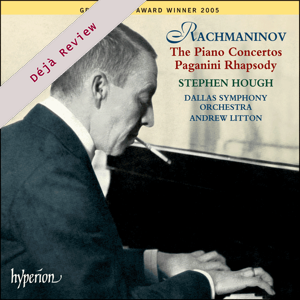
Déjà Review: this review was first published in October 2004 and the recording is still available.
Sergei Rachmaninov (1873-1943)
Concerto for Piano and Orchestra No. 1 in f-sharp minor, Op. 1 [26:02]
Concerto for Piano and Orchestra No. 2 in g minor, Op. 40 [24:35]
Rhapsody on a Theme of Paganini, op. 43 [23:44]
Concerto for Piano and Orchestra No. 2 in c minor, Op. 18 [32:26]
Concerto for Piano and Orchestra No. 3 in d minor, Op. 30 [38:23]
Stephen Hough (piano)
Dallas Symphony Orchestra/Andrew Litton
rec. live, May 2004, Eugene McDermott Concert Hall, Morton H. Meyerson Symphony Center, Dallas, USA
Hyperion CDA67501/2 [2 CDs: 146]
In an era when performance practice issues, right down to careful research into the regional dialects used for vocal music, are all the rage, it seems rather unusual that the nineteenth and twentieth centuries have been left out of the fray. Andrew Litton and Stephen Hough have taken some steps to bring more recent music into the discussion with these enlightening performances of the concertante works by Rachmaninov, who despite his life-span, stuck firmly with romantic ideals.
It has been the tendency in recent decades to over-sentimentalize Rachmaninov’s music, thus transforming passionate lyricism into syrupy languor. Not so these performances. Hough has taken great pains to listen carefully not only to the composer’s own recordings, but also to those of artists that he most approved, specifically Josef Levhinne and Vladimir Horowitz. He and Litton have also meticulously corrected errant orchestral parts that have been so often used as to become canon.
This is playing of the highest order both from soloist and orchestra. So often, with a new recording of such well-traveled works, it is the tendency of the cognoscenti to immediately dismiss the living performer as in no way capable of comparison to some famed corpse. I am here to tell you that Steven Hough can hold his own against any Horowitz, Richter or Rubinstein. His fleet playing, clarity of line and phenomenal technique shine like beacons. There are no studio tricks to cover mistakes; these are live recordings. Andrew Litton shapes the Dallas Symphony into a taut ensemble, playing with a unity of sound and an attention to the give and take of melodic line that would be the envy of any fine choir. This orchestra sings together with abandon.
Most refreshing are the tempo choices, particularly in the more famous, often-overwrought second and third concerti. Gone are the layers of overt varnish. Mr. Hough never stretches a moment for his own sake, rather he concentrates on the lyricism and forward momentum that were the hallmarks of the composer’s own playing.
I found these readings to be revelatory and refreshing. For the first time in a long time, I was actually riveted to the speakers, anxiously anticipating the unfolding story. Too often, a listener can simply take for granted that he knows what will happen next. What a treat to have a few surprises.
And, lest one think that there is no romanticism here, start your exploration of this set with the famous “18th Variation” from the Paganini Rhapsody, and you will rest at ease. Mr. Hough plays this achingly lyrical line to absolute perfection.
Program notes are peerless. The detail is meticulous and the writing style is captivating. The Dallas audiences, notorious for their noisiness and lack of decorum, (I can say that, I live here) are on their very best behavior, making for studio quality recording with Hyperion’s customary finesse. I could have lived without the applause at the end of each concerto, but that is a small complaint given the extremely high quality of everything else about this set.
A must have. A revelation. Get it.
Kevin Sutton
http://www.musicweb-international.com/classrev/2004/Oct04/Rachmaninov_Hough.htm
Help us financially by purchasing from




















